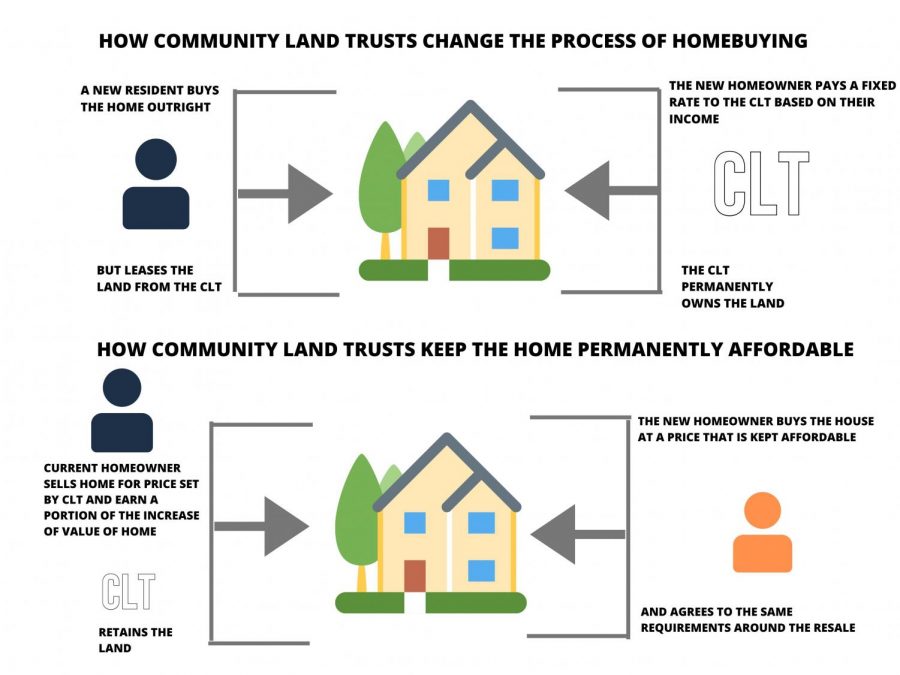Living in the “Big Easy” might be getting easier
November 20, 2019
For the first time in 10 years, Richie Champagne has now been able to move into a home in the Lower Ninth Ward that he calls, “100% his own.”
After numerous setbacks like rebuilding his credit and facing several job lay-offs, Champagne lived with his parents in St. Charles Parish, Louisiana, but still made the 45-minute commute to his day job in New Orleans.
“I am thrilled to finally be here. People always asked if I ever thought I would live here [in New Orleans], and I told them probably not, but here I am,” said Champagne.
Shockingly, all Champagne had to put down for his new home was $1000.
Champagne used the community land trust model to afford his home, an opportunity made possible through the organization Crescent City Community Land Trust.
The traditional community land trust model allows for a new homeowner to purchase the home, but lease the land it sits on. Homeowners pay a monthly fee based on their total income to the land trust organization.
Once the homeowner decides to sell the home, the price is set by the community land trust organization, and the homeowner is able to get a portion of the increased value of their home. A new resident is then able to purchase the home, at a price that is kept affordable.
“It’s all positive. If you make the payments on time, which I plan to do, you’re able to build your credit and gain wealth through possessing equity of the property,” said Champagne.
The Greater New Orleans Housing Authority said the number of affordable housing options in the city went negative last year as the city was unable to sustain the housing options it had created. Currently, the city needs over 33,000 affordable housing units.
“The majority of affordable housing options we see in the city are temporary. All government subsidies have a compliance period or time frame during which the properties must be made affordable. Through the community land trust model all subsidies are kept in the property and pursue long-term affordability,” said executive director of Crescent City Land Trust, Julius Kimbrough.
The organization has been in existence since 2011, and now has 10 homes for sale in the Lower Ninth Ward. The first home in the Lower Ninth Ward was sold to Champagne, and the organization has plans to build homes in the Broadmoor and Hollygrove communities.
With this sale, the organization now brings a new affordable housing option for the city. While New Orleans carries the name “The Big Easy,” an issue that hasn’t been easy to swallow for some residents is how unaffordable the city has become. Since Hurricane Katrina, home values have risen 54% and rent is up 50%since Katrina, according to the Katrina Index.
GNOHA recommends that a person should spend 30% of their gross income on housing, for a home to be considered affordable. Currently, 37% of renters pay more than 50% of their income for housing, which is a more than 100% increase from 2004, and about 24 percent residents spent more than half their earnings on housing, according to the Data Center Analysis of New Orleans.
Andrenecia Morris, executive director of HousingNOLA, has been advocating for the passing of Amendment Four in Orleans parish, which would give the city the right to freeze or eliminate the assessed values for properties with 15 units or less. According to city officials, with the added tax break, landlords would hopefully be encouraged to keep rent prices affordable.
“We unapologetically say put housing first, not because we care about housing issues, but we believe that issues like education and criminal justice reform have struggled recently because we have ignored the importance of affordable housing,” said Morris.
According to the most recent polls, Amendment Four was defeated 63 parishes to 1.
John Lovett, De Van D. Daggett, Jr. Distinguished Professor of Law, believes that the work that the affordable housing options that CCCLT is working to provide in Orleans Parish is a positive change that could be groundbreaking because community land trusts enable cities to preserve the initial investment for multiple generations of homeowners.
“Because of affordability requirement on the sale of the property, when the property is sold if there’s been an increase in the price of the home, the initial homeowner is able to keep a modest portion of equity but also must give a portion to the community land trust. This enables the next home to be permanently affordable for the next wave of homeowners,” said Lovett.
The community land trust model could also be beneficial in rebuilding areas that face economic distress like the Lower Ninth Ward.
“Prior to Katrina, the Lower Ninth Ward had the highest concentration of homeowners, and it has proximity to downtown where many New Orleanians work,” said Kimbrough.
Champagne has already noticed a difference in the neighborhood since CCCLT began working in the community.
“It’s a completely different world. There’s plans to build a community park outside my house. It used to be an area that you wouldn’t want to slow down at red light, now I’m completely comfortable here,” said Champagne.
